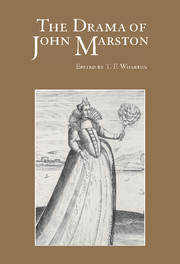Book contents
- Frontmatter
- Contents
- Notes on contributors
- Acknowledgements
- Note on the text
- Introduction
- 1 John Marston at the ‘mart of woe’: the Antonio plays
- 2 John Marston: a theatrical perspective
- 3 Varieties of fantasy in What You Will
- 4 Safety in fiction: Marston's recreational poetics
- 5 Insatiate punning in Marston's courtesan plays
- 6 Touching the self: masturbatory Marston
- 7 ‘Two parts in one’: Marston and masculinity
- 8 The Malcontent: hunting the letter
- 9 The Dutch Courtesan and the profits of translation
- 10 Sexual politics in Marston's The Malcontent
- 11 Marston: censure, censorship, and free speech
- 12 Ill-mannered Marston
- Index
8 - The Malcontent: hunting the letter
Published online by Cambridge University Press: 01 October 2009
- Frontmatter
- Contents
- Notes on contributors
- Acknowledgements
- Note on the text
- Introduction
- 1 John Marston at the ‘mart of woe’: the Antonio plays
- 2 John Marston: a theatrical perspective
- 3 Varieties of fantasy in What You Will
- 4 Safety in fiction: Marston's recreational poetics
- 5 Insatiate punning in Marston's courtesan plays
- 6 Touching the self: masturbatory Marston
- 7 ‘Two parts in one’: Marston and masculinity
- 8 The Malcontent: hunting the letter
- 9 The Dutch Courtesan and the profits of translation
- 10 Sexual politics in Marston's The Malcontent
- 11 Marston: censure, censorship, and free speech
- 12 Ill-mannered Marston
- Index
Summary
There is a mystery at the heart of Marston's drama, and it remains unsolved to this day. T. F. Wharton concludes his account of The Critical Fall and Rise of John Marston from Marston's time to the present by advising critics who like their literature to yield coherent visions of the world to look elsewhere: ‘Those who seek consistency and wholeness will be disappointed, not only when they seek it across his canon but when they look for it within single scenes or even lines. His is not a rigorous theological or philosophical position.’ Keith Sturgess concurs: despite the publication of several full-length studies of Marston during the last three decades, his drama ‘remains enigmatic and difficult to place for the modern reader or theatre practitioner. There is little consensus about the source, or sources, of the distinctive dramatic voice we hear, or about the meaning and significance of the texts themselves.’ And nowhere is the enigmatic quality of Marston's æuvre more apparent than in the play most critics consider to be his masterpiece, The Malcontent.
In other words, criticism of Marston still finds itself confronted with the questions posed over sixty years ago by T. S. Eliot's tantalizing essay on the dramatist. Of The Malcontent, Eliot writes:
We are aware, in short, with this as with Marston's other plays, that we have to do with a positive, powerful and unique personality. His is an original variation of that deep discontent and rebelliousness so frequent among the Elizabethan dramatists. […]
- Type
- Chapter
- Information
- The Drama of John MarstonCritical Re-Visions, pp. 145 - 161Publisher: Cambridge University PressPrint publication year: 2001



